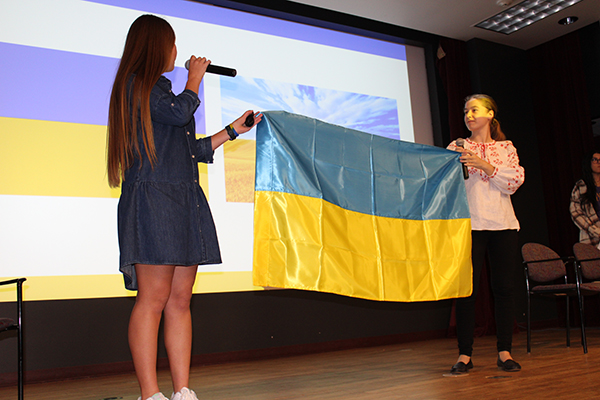Ukrainian scholarship students present 'Ukraine As It Is'

“I woke up to the sound of explosions,” Yuliia Koreiba recalled last week. “We’re being killed, we’re being terrorized on purpose.”
The first-year Alfred University student, a resident of Kyiv, Ukraine, was part of a program held Thursday, Oct. 27, in Nevins Theater, titled “Ukraine As It Is.” She was joined by Alina Zabihailo, Artem Kolisnychenko and Bozhena Snizkho, three other first-year students attending Alfred University as part of a scholarship program spearheaded by President Mark Zupan and supported by Alfred University’s Board of Trustees.
“Ukraine As It Is,” hosted by Alfred University's International Student Association, presented a wide ranging overview of Ukrainian culture, as well as the students’ searing recollections of Russia’s invasion of Ukraine earlier this year, buttressed by video and photographic images of the war’s devastation.
Good news mixed with bad: “We believe we are fighting on the right side,” Koreiba said, “and we are fighting against evil… Someone’s father is now on the battlefield. Even though they are trying to break us, we will not give up.”
But along with the grimness of the war in Ukraine, the students recalled what is uplifting and enduring about Ukrainian culture, including discussions of the Ukrainian language, folk and popular music, the Ukrainian education system, Ukrainian technology, and of course Ukrainian food.
The latter will be featured in a future event organized by Alfred University’s International Student Association and highlighting foods of the many countries from which Alfred University students hail. It’s something to look forward: “Ukraine As It Is” presented mouth-watering images of foods such as Nalysnyky, Verenyky, and Borshch.
Koreiba and Zabihailo served as principal speakers during the event, taking turns sharing details of Ukrainian culture and society with the audience. A few fascinating details:
* The popular Christmas song “Carol of the Bells” was created by Ukrainian composer Mykola Leontovych, in 1914.
* The American habit of making small talk may not go over so well in Ukraine. “We don’t do chit chat,” said Zabihailo.
* Ukrainian public education historically has extended from first through the 11th grades; a 12th grade was added to the national curriculum recently. Students undergo a mandatory schedule of classes through the 12-year period.
* Considering its population, Ukraine packs a wallop in the invention of new technologies. The popular messaging app What’s App was created by Ukrainian Jan Koum, who founded the company before its acquisition by Facebook (He is now a billionaire). The start-up Looksery (which merged with Snap Inc, the originator of Snapchat), was founded by Ukrainians Victor Shaburov and Yurii Monastyrshin.
* The Russian and Ukrainian languages intermingle in east Ukraine, but further west, the Ukrainian language dominates. “In Poland,” said Zabihailo, “they won’t understand you if you’re speaking Russian, but they will understand Ukrainian.”
* Interested in visiting Ukraine someday? The Carpathian mountains are a must-see.
One tragic takeaway from “Ukraine As It Is”: The beauty and complexities of Ukrainian culture are suffering under the extraordinary violence inflicted by Russia on civilian centers. “Ukraine As It Is” evoked comparisons with London under the Blitz of World War II – only magnified across a country.
But Zabihailo and Koreiba said the war is having a similar effect on the Ukrainian morale. Like Londoners’ spirit in 1940-41, Ukrainian resolve continues to stiffen. “The war has united us like never before,” Koreiba said.
